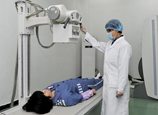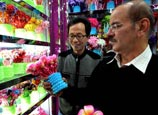
BEIJING, April 18 (Xinhua) -- While recent Chinese economic data has prompted talk of weakening in the first quarter of 2013, policy makers and scholars are seeing an opportunity for a new round of expansion.
Figures in some sectors more reliant on the market and innovation have pointed to a transforming and improving economy, they said.
China's gross domestic product (GDP) rose 7.7 percent in the first quarter, with 4.3 percentage points coming from consumption, the National Bureau of Statistics (NBS) announced Monday.
The value-added output in the country's service sector expanded 8.3 percent in the first quarter, 0.5 percentage points higher than that of the secondary industry.
From January to March, high-tech industries realized 11.9-percent growth in value-added output, faster than in the fourth quarter of 2012, while the growth of high-energy-consuming heavy industries slowed 1.1 percentage points, the NBS data show.
China's purchasing managers' index (PMI) for the manufacturing sector rose to 50.9 percent in March, up slightly from 50.1 percent in February, the China Federation of Logistics and Purchasing (CFLP) said.
The index stayed above 50 for the sixth consecutive month and hit an 11-month high in March, according to the CFLP.
A PMI reading of 50 or greater indicates expansion, while a reading below 50 indicates contraction.
In the first quarter of 2013, China's foreign trade rose 13.4 percent year on year, higher than the growth of 6.2 percent for the entirety of 2012, according to the country's General Administration of Customs.
Meanwhile, the Ministry of Human Resources and Social Security said over 3 million new jobs were created in the first quarter, indicating an improving employment situation.
Tang Jianwei, an analyst with China's Bank of Communications, said he believes these statistics show that the Chinese economy is entering a new stage of development as planned.
"China should find a way to tackle the trend of slowing economic growth in the mid- and long terms," Tang added.
The global economic slump has forced China to change its expansion pattern from being export-dependent to boosting domestic demand and innovation, as well as sustainable development.
Liu Yuanchun, assistant dean of the School of Economics at the Renmin University of China, said China remains a vigorous force for boosting the world economy.
"The current pace means a big room for policy operation regarding transformation of economic growth patterns," Liu said, adding China's economy is entering a new period of expansion, or the updated version of the economy.
On March 17, Premier Li Keqiang first mentioned an updated version of China's economy.
"The beginnings of the reform and opening up, marketization and joining the World Trade Organization (WTO), respectively, saw three rounds of Chinese economic surges," Tang explained, adding that this new round of economic expansion will be supported by transformation and economic growth plans.
Liu said the new round of economic expansion should be expected because of increasing public appeals and the government's commitment to profound reform.
Further marketization and fewer restrictions on private capital are key for opening a new period of Chinese economic growth, Tang said.
















 A father posed nude at an art studio, to raise money for his children's medical expenses
A father posed nude at an art studio, to raise money for his children's medical expenses


![]()
